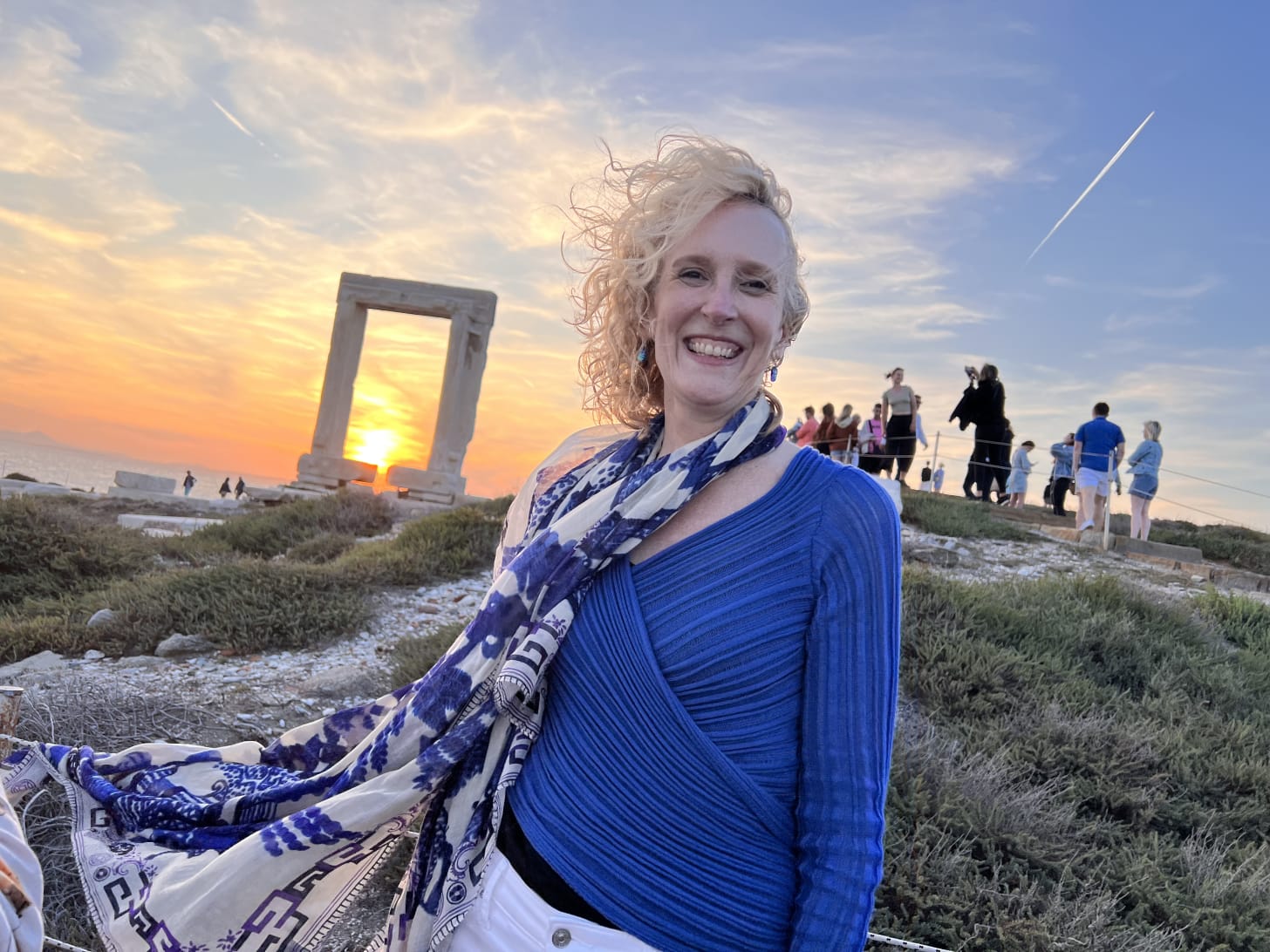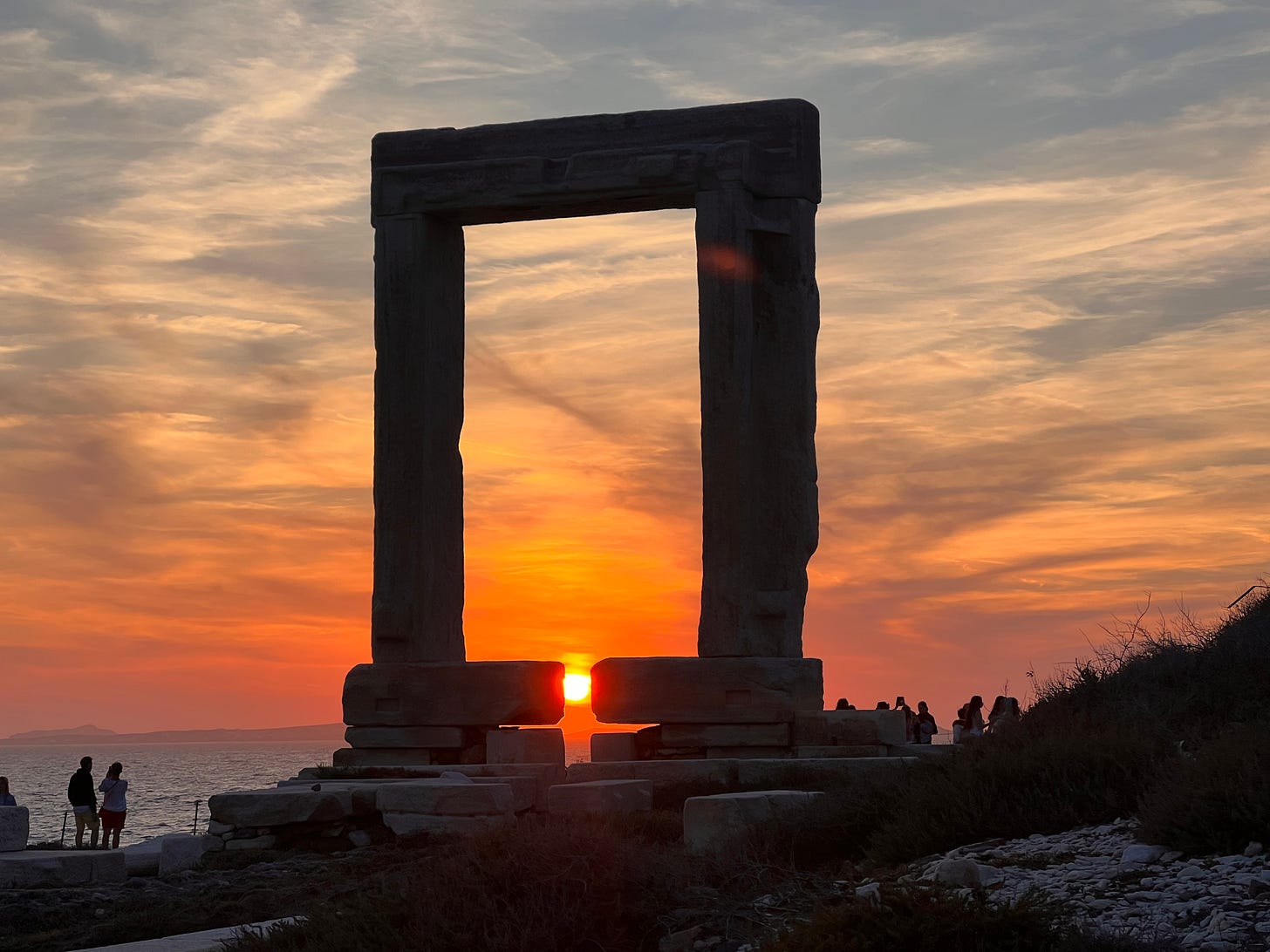Apollo's Gate
Democracy is at a crossroads
In June, I fulfilled my childhood dream of going to Greece. At a time when women’s freedoms are being curtailed and democracy eclipsed, it felt like a good moment to draw inspiration from Athens, the birthplace of democracy and the Bronze Age Minoan Civilization with its famous Snake Goddess and other artwork suggestive of an ancient civilization ruled by women.
I know, a Christian might be expected to see the great Pauline landmarks and Byzantine churches and here I was paying my respects to pagan sites. I do love Jesus, but it was the Minoan Snake Goddess who captivated me as a snake loving feminist girl growing up a fish out of water in the South. I did not fit in at home, but at least I had something in common with the women of ancient Crete.
The site that took me by surprise was a ruin on the island of Naxos. Upon arrival by ferry I dropped my bags and raced to the Potara (the great door) of Apollo for sunset. This massive marble door frame is all that remains of what would have been an impressive temple. The 6th century ruler Lygdamis had embarked on a massive building program by overtaxing and impoverishing his own people. They overthrew him, and over time the stones were confiscated and used for basic needs–to build homes and public buildings. You can spot some of these stones, snatched from a tyrant, around the island. For over two thousand years the massive door lintels remained because they were too heavy for anyone to move.
The sun sets through this western facing portal, changing the landscape minute by minute as it sinks past the horizon. I found myself on what felt like the edge of time and space, the black-blue Aegean water thrashing on every side, the wind whipping my hair into its own Medusa-like tendrils. The islet was packed with tourists paying their own respects alongside me. Here we were, gasping at the weight of that marble gateway kissed by the fleeting wind and orange light.
Throughout time human freedom has come up against the weight of Apollo’s gate: our temptation to install oppressive systems over and against the loftier visions of our philosophers and moral leaders. This can overwhelm us, but I take hope in the persistence of the vision itself. Although Athenian democracy lasted only two centuries, it inspired modern democratic institutions. The ancient Jewish creation story revolutionized God as One who created humans for dignity not slavery. It inspired abolitionist movements, segregation, apartheid and Latin American authoritarianism even as others tried to manipulate the faith to justify anti-semitism, the crusades, colonization and authoritarianism.
What of our own time and place?
Despite our democracy’s own grave flaws (women did not get the right to vote until 1920 and Black people were not full participants in American democracy until the 1960s), given a choice between living in an aspiring democracy or dictatorship, most will choose an imperfect democracy. Citizens of liberal democracies have more political and civil rights than those who live in non-democracies. They are happier, wealthier, better educated and have a higher life expectancy than people living in dictatorships.
Fledgling democracies have often been fragile while overcoming factionalism, but today a new trend is emerging. Since 2000, old, stable democracies have seen democratic leaders come to power via elections but then consolidate authoritarian rule: Poland, Hungary, Brazil, India and now the U.S. whose democracy rating plunged in 2017. Twenty-five countries are now severely affected.1
Another trend is the rise in religious and ethnic factionalism. Since the end of the Cold War as many as 75 percent of civil wars have been fought by these types of factions rather than over political ideology.
In other words, today the entire world stands at Apollo’s gate.
The struggle for human freedom and flourishing is our core spiritual struggle. What happens to our own democracy here in the U.S. will impact the fate of democracy globally, maybe the very existence of democracy itself. Regardless, humanity will always seek freedom because we were made for it.
It's an overwhelming thought and yet, there is much we can do to inspire people of faith to play a unique role in interrupting the use of religion itself to encourage factionalism and violence. Our faith calls us to restore human dignity in the broken places in our communities, to follow this God who frees the slaves and those who are oppressed.
Keep speaking up as a Christian, Jew, Muslim, Sikh or Buddhist, secular humanist– whatever your tradition might be– helping people to understand the liberative vision of our sacred texts, whether that be a family member, neighbor or politician. Join local pro-democracy and bridge building groups and get to know leaders of faiths and races different from your own. Democracy thrives on pluralism and the best way to protect that is through diverse relationships.
Today, Christian nationalists want to be the dominant voice of faith. They seek to pit Christians against those of other faiths and those who are secular. We cannot allow them to do that– for the sake of our faith and the sake of all humanity who are on this fragile quest toward a global democracy where all can thrive.
Barbara Walter. How Civil Wars Start and How to Stop Them. New York: Crown. 2022.



